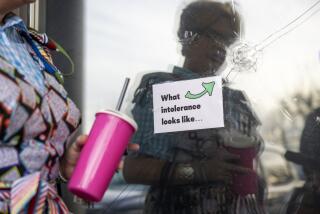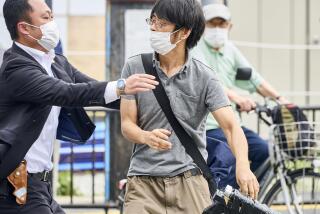Surgeon/cop straddles two worlds of violence
His team already was dressing for battle, and Andrew Dennis was trying to catch up.
With the trunk of his car open, he secured his rifle. Helmet. Headset. Pistol. Taser. He was then quickly briefed about the night’s target: a small home on a dark street with someone inside rumored to be carrying a gun.
Cook County sheriff’s deputies believed there were drugs inside, and the hostage barricade and terrorist team was going in to find them.
About 30 minutes earlier, Dennis had raced out of Stroger Hospital from his other job, where he treated one last patient who was injured a car crash. Now he would help provide cover to an officer who would toss the flash-bang grenades. If things went wrong and someone got hurt, a message on the headset would signal Dennis and other medics to go inside.
Dennis was ready -- he’d switched from scrubs to fatigues and had a new purpose. The trauma surgeon with a special skill for reconstructing abdominal walls was ready to help kick in a door.
For about eight years, Dennis has straddled two worlds brimming with violence -- working as a surgeon in one of the busiest trauma units in the U.S. and as a sworn police officer and unpaid member of two Chicago-area SWAT teams.
“Anything can go wrong,” Dennis said when asked about the similarities of his work. “Police officers learn how to face-read and mind-read and are typically more hyper-aware of situations, especially SWAT cops. Trauma surgeons are not that much different. You learn how to read patients.”
Dennis’ primary focus as a member of the SWAT teams is to provide immediate care to anyone who gets hurt during a raid. The mission that night took less than a minute. When it was over, he waited in the front yard with his team as the house was cleared. Nearly 4 pounds of marijuana and a gun were seized. A 21-year-old man was charged with weapons and drug violations.
The 39-year-old surgeon is not normally the one poised at the top of a gangway with an assault rifle.
He usually goes in as a “protected entity,” which puts him, pistol in hand, in the back as officers forcibly enter a building. He’s never had to fire his gun in the line of duty.
Adding medics to SWAT teams is a growing practice. But it is rare to have a trauma surgeon assigned to a SWAT team who is also a sworn officer.
Dennis fell into the work in 2001 after officers he met during his residency suggested he join a team. After a series of calls, he met with Mike Volling, who was then commander of a cooperative SWAT team that is part of the Northern Illinois Police Alarm System, a mutual support system of departments.
“My first thought was, something is wrong with this guy,” Volling said. “Why does this physician want to come out and play with the police?”
Soon, Volling said, he recognized that Dennis was not merely interested in kicking in doors -- he wanted to bring expertise to the team.
“He explained to me that on a busy night at Cook County he treats 10 to 15 victims,” Volling recalled. “I said, ‘This is the guy we’ve got to get.’ ”
The Des Plaines, Ill., police took Dennis on as an unpaid part-timer, which provided him a place to train and get certified as a police officer.
The worst-case scenario Dennis and other medics face is treating a critical injury such as a gunshot wound.
More likely scenarios involve a twisted ankle or a heart attack.
“Should something like that happen . . . if we can save one life or save someone from prolonged injury, we did a good thing,” said Bill Evans, the commander of Cook County’s hostage barricade and terrorist team.
On the SWAT teams, Dennis has dealt with training injuries and panicked calls from fellow officers about getting the H1N1 flu shot. He has taught them how to recognize heat exhaustion, as well as the sound of a sucking chest wound -- an urgent medical emergency in which air is escaping from a puncture.
“The majority of issues we deal with on SWAT are not traumatic in nature,” Dennis said. And officer survival, he said, “is paramount -- to empower and equip these individuals, who are putting their lives on the line for you and me, to be able to go home to their families.”
More to Read
Start your day right
Sign up for Essential California for news, features and recommendations from the L.A. Times and beyond in your inbox six days a week.
You may occasionally receive promotional content from the Los Angeles Times.






